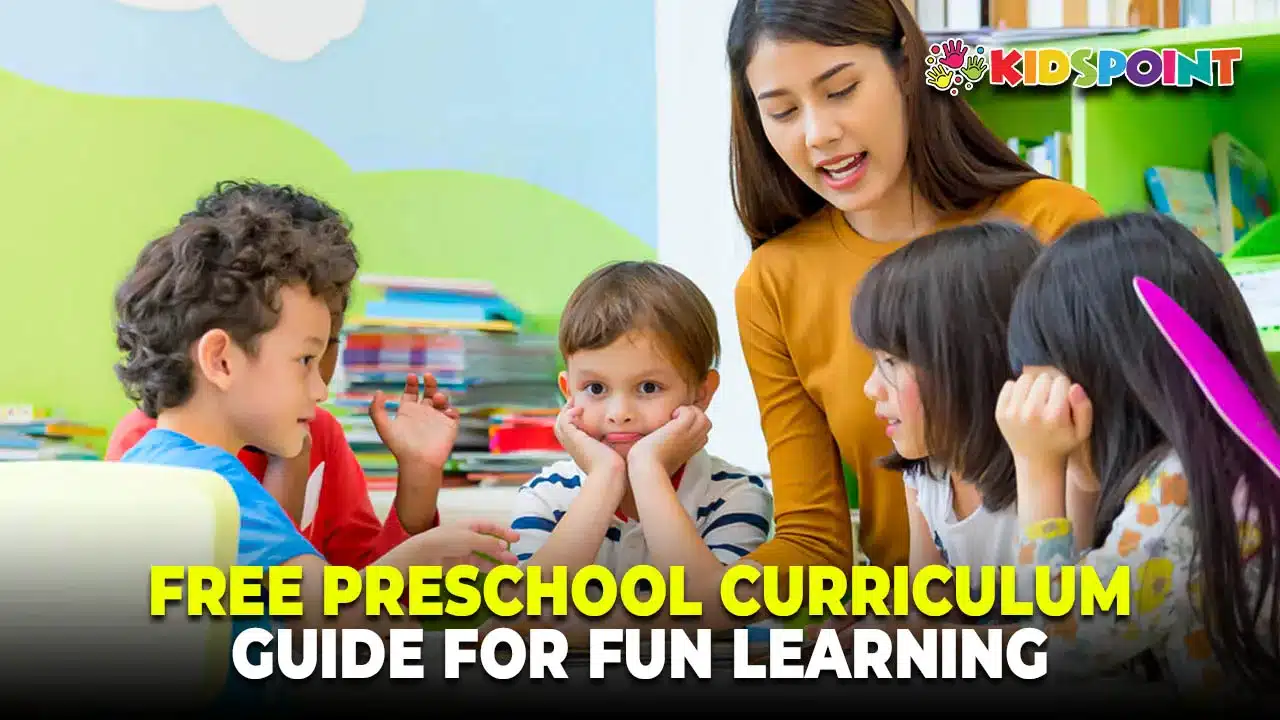Preschool is a crucial stage in a child’s early education, laying the foundation for future learning and development. A well-structured curriculum helps children develop cognitive, social, and motor skills while keeping them engaged through fun activities. However, finding a high-quality preschool curriculum that is both effective and budget-friendly can be challenging. That’s where a free preschool curriculum comes in handy. Whether you’re a homeschooling parent, a preschool teacher, or a caregiver looking for engaging learning materials, this guide will help you structure an enriching curriculum without spending a fortune. At The Kids Point, we believe that learning should be accessible and enjoyable for all children, and that’s why we’ve compiled this comprehensive guide to free preschool curriculum options.
Benefits of a Free Preschool Curriculum
A free preschool curriculum provides structured learning opportunities without financial strain. Here are some key benefits:
- Cost-Effective: You can find high-quality learning materials online without purchasing expensive textbooks or lesson plans.
- Flexible Learning: Adjust lessons to fit your child’s pace, interests, and strengths.
- Engaging Activities: Many free resources include hands-on activities, interactive worksheets, and educational games.
- Parent-Child Bonding: Homeschooling or guiding a preschooler at home strengthens the bond between parents and children.
- Customized Learning Paths: Unlike traditional preschool programs, a free curriculum allows you to personalize learning based on your child’s developmental needs.
Essential Elements of a Preschool Curriculum
A well-rounded preschool curriculum should include various subjects and activities that promote holistic development. Below are the key areas to focus on:
Language and Literacy Development
- Alphabet Recognition: Activities such as alphabet puzzles, flashcards, and letter-tracing worksheets.
- Phonemic Awareness: Rhyming games, sound matching, and beginning letter sounds.
- Storytelling and Reading: Daily read-aloud sessions and picture-based storytelling.
- Writing Skills: Pre-writing strokes, tracing letters, and simple word formation.
Mathematics and Early Numeracy
- Number Recognition: Counting objects, number songs, and interactive number games.
- Basic Addition and Subtraction: Using toys or household objects for simple math concepts.
- Patterns and Sequences: Sorting and arranging items in a particular order.
- Shapes and Colors: Identifying and categorizing different shapes and colors through hands-on activities.
Science and Nature Exploration
- Basic Experiments: Simple science projects like floating and sinking activities or color mixing.
- Observing Nature: Exploring plants, animals, weather changes, and seasonal observations.
- Sensory Play: Activities involving textures, smells, and different materials to stimulate sensory learning.
Arts and Creativity
- Drawing and Coloring: Freehand drawing and coloring pages.
- Craft Activities: DIY projects using everyday household items.
- Music and Movement: Singing nursery rhymes, dancing, and using musical instruments.
- Pretend Play: Role-playing games like grocery shopping, cooking, or playing doctor.
Social and Emotional Development
- Manners and Social Skills: Teaching kindness, sharing, and taking turns.
- Feelings and Emotions: Identifying different emotions through storytelling and discussion.
- Cooperative Play: Group activities that encourage teamwork and problem-solving.
Physical Development
- Fine Motor Skills: Activities like cutting with scissors, threading beads, and using tweezers.
- Gross Motor Skills: Jumping, running, climbing, and other physical activities.
- Outdoor Play: Free play at the park, obstacle courses, and nature walks.
Free Preschool Curriculum Resources
Here are some excellent free curriculum resources available online:
1. Easy Peasy All-in-One Homeschool
- Covers preschool through 12th grade.
- Includes printable worksheets, activities, and guided lessons.
- Focuses on language arts, math, science, social studies, and more.
2. The Good and the Beautiful
- Free downloadable curriculum for language arts and math.
- High-quality, literature-based approach to early learning.
3. Discovery K12
- Free online homeschool program with a structured curriculum.
- Daily assignments in language arts, math, science, social studies, and physical education.
4. ABCmouse (Free Trial)
- Interactive games and learning activities.
- Covers reading, math, art, and science.
5. Starfall
- Early reading and math activities.
- Phonics-based approach to literacy development.
6. PBS Kids Learning
- Educational games and videos based on popular children’s shows.
- Helps develop problem-solving, literacy, and social skills.
7. Khan Academy Kids
- Free app for early learning.
- Interactive lessons in reading, writing, math, and creativity.
Creating a Preschool Schedule
A flexible yet structured schedule is key to a successful preschool curriculum. Here’s a sample daily plan:
Sample Daily Schedule
8:00 AM – 8:30 AM – Morning routine (breakfast, getting dressed, and hygiene)
8:30 AM – 9:00 AM – Calendar time (days of the week, weather, songs)
9:00 AM – 9:30 AM – Learning Activity (Letter of the day, numbers, shapes)
9:30 AM – 10:00 AM – Creative time (arts, music, sensory play)
10:00 AM – 10:30 AM – Snack and outdoor play
10:30 AM – 11:00 AM – Storytime and discussion
11:00 AM – 11:30 AM – Hands-on learning (science, sorting, counting games)
11:30 AM – 12:00 PM – Free play and wrap-up activities
Tips for a Successful Preschool at Home
- Follow Your Child’s Interests: Observe what excites your child and incorporate those themes into lessons.
- Use Everyday Moments for Learning: Count stairs while climbing, discuss colors while dressing, or read signs while driving.
- Encourage Hands-On Activities: Children learn best through play and exploration.
- Mix Structured and Unstructured Time: Allow free play alongside structured lessons.
- Be Patient and Flexible: Some days will be more productive than others, and that’s okay!
Providing a quality preschool education at home doesn’t have to be expensive or overwhelming. With the right free resources, a structured approach, and a fun learning environment, you can set your child up for success. At The Kids Point, we believe that every child deserves access to engaging and meaningful education, and we hope this guide empowers parents and caregivers to make learning an enjoyable experience. Start your preschool journey today with these free resources and create a fun-filled, enriching learning environment for your child!


